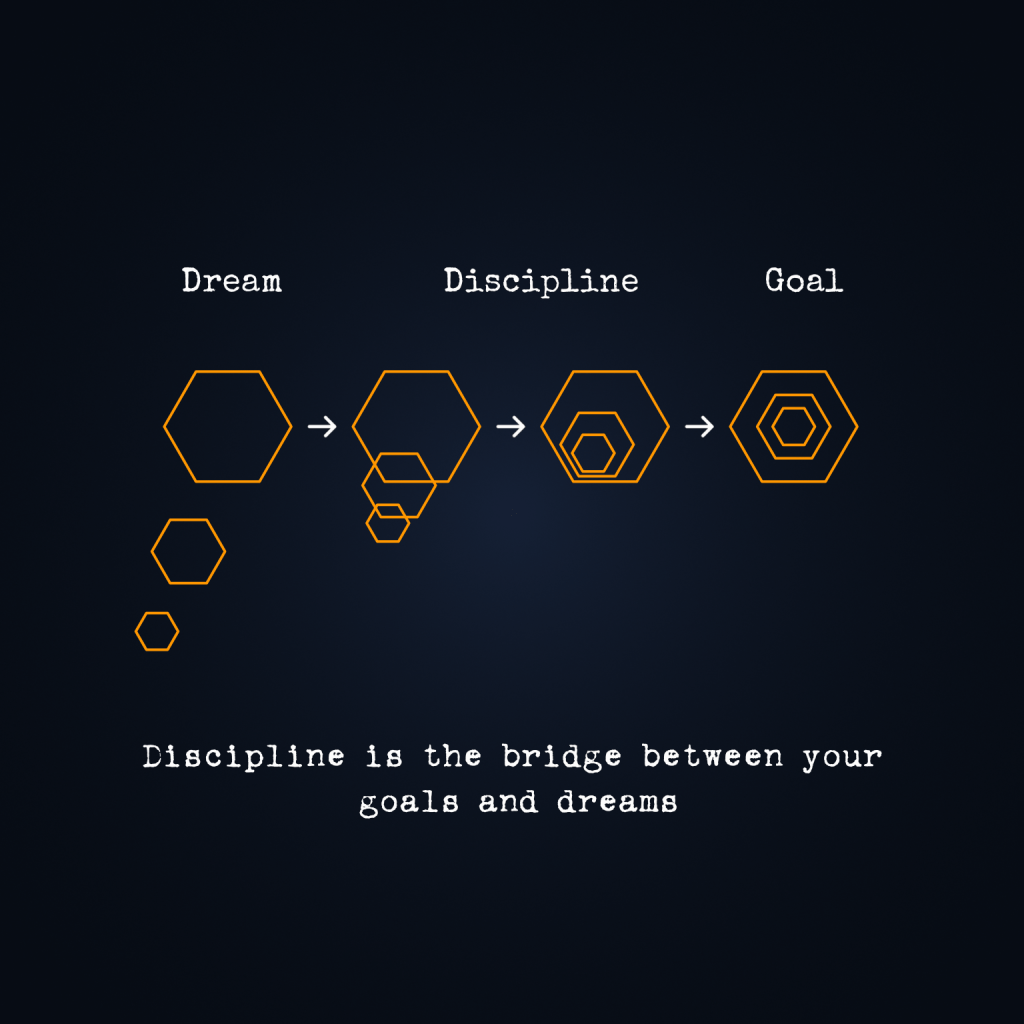Today at a Glance
- Plunge into a world where self-discipline is your secret weapon, propelling you towards the life and business you've always envisioned.
- What self-discipline is about
- The Top 5 Benefits of Self-Discipline
- How to Build Self-Discipline — 8 Strategies to Evolve and Get More out of Life

You had the best intentions. Self-discipline. Determination. You even started to eat better, get your body moving, or start that side hustle. Then you lost control — somehow. You felt like a failure. One day became two. Then three. A week. A month.
Then you realize another year has passed by. You think again about leveling up your life. We’ve all been there. But it doesn’t have to be that way.
See, self-discipline is a practice. Not every day will be perfect, but each day — failures and small wins included — brings you closer to your goal.
Here’s a little story that fascinated me from the very first moment:
Sara Blakely, the founder of Spanx, faced numerous rejections and challenges when she was trying to launch her innovative shapewear product. No one believed in her idea — but she did.
Her initial setbacks became her fuel. She persisted in her vision and belief in the product. Today she’s known for her unwavering determination and self-discipline because she successfully marketed Spanx, which ultimately revolutionized the undergarment industry.
Sara’s resilience and tenacity made her the youngest self-made female billionaire in the world.
If this success is something you could imagine for yourself, read on.
But first, let’s get clear on what self-discipline is…
What is Self-Discipline
Self-discipline is the practice of doing the hard things your brain already knows are a good choice. Self-discipline means controlling immediate impulses and motivating yourself to stay focused on achieving sustainable success. For example, if you want to lose some pounds you might need to not buy sweets, potato chips, or soda and cook some healthy meals yourself.
"It was character that got us out of bed, commitment that moved us into action, and discipline that enabled us to follow through."
— Zig Ziglar
The Top 5 Benefits of Self-Discipline
Practicing self-discipline can boost your well-being and various significant outcomes in your life, from health to relationships, to your career or business. It’s essential for personal and professional growth.
Here are five key advantages of cultivating self-discipline:
1. Achieve long-term goals
Self-discipline helps people stay focused on their objectives and persistently work towards achieving them.
Self-discipline is like a muscle: the more you train it, the stronger you become.
By maintaining a strong sense of passion, commitment, and willpower, you can overcome any obstacle or challenge. Author and researcher Angela Duckworth call that “grit”.
2. Improve daily productivity
Those with self-discipline effectively manage their time and resources better.
Working efficiently means staying organized, prioritizing tasks, and avoiding distractions. If you optimize your work processes you can accomplish more within a set timeframe. You even have more energy left in the tank to do other stuff.
3. Enhance mental resilience
When we develop self-discipline it fosters our mental resilience and the ability to cope better with adversity and setbacks.
By practicing self-discipline you can better navigate challenges, setbacks, and failures. You’ll find that you bounce back and continue your pursuit of sustainable success way easier.
4. Boost physical health and well-being
This one is pretty obvious. People who demonstrate regular self-discipline cultivate healthy habits — regular exercise, balanced nutrition, and adequate rest — easier.
You practice self-control and make conscious choices to maintain a healthy lifestyle (and resist an unhealthy one).
For example, mindful movement and exercise promote a sense of control over the body that translates to an improved sense of control over other aspects of — a key defense against stress.
5. Increase your self-confidence
Consistently exercising self-discipline will boost self-confidence and self-esteem. Accomplishing goals and adhering to a disciplined lifestyle creates freedom.
It instills a sense of pride and accomplishment. The more you create that positive self-image and belief in your abilities the better you overcome future challenges and succeed in various endeavors. You become part of the “Momentum Society”.
How to Build Self-Discipline — 8 Strategies to Evolve and Get More out of Life
Self-discipline is all in your head. A board meeting happening right in your prefrontal cortex, the brain’s control center for focus, impulse control, and emotion.
See, it’s often inherently in conflict with the more logical, rational part of our brain. So, to change our behavior, we need neuroscience-backed strategies. We want to be pros and not rely on willpower alone.
As you change, your brain goes through a makeover too, wiring your reward centers to disciplined behavior. It’s like leveling up in a video game!
Imagine being a newbie runner. Those initial runs might make you feel like a wheezing grandpa. But then, boom! You start feeling endorphins and dopamine, the brain’s driving chemicals, making you feel the physical benefits, and making you want to run more.
So, let’s get your brain working for you, not against you!
1. Spot your growth zones
Start by identifying areas in your life that you need to improve. This might be an obvious red flag, such as poor health screening results, a negative performance review, or a loved one’s request for change.
If you’re unsure where to begin, document how you spend your daily time and energy. (read more on energy thieves here) Use your calendar or phone’s screen time report as a reference. Reflect on your core values and evaluate whether your behaviors align with them.
There might be daily activities that don’t adhere to your values, which is true for everyone.
Don’t worry about addressing all these areas simultaneously. I tried it — not a great idea. Begin by understanding the larger picture. Once you cultivate self-discipline in one aspect of your life, you’ll find it easier to apply to other areas.
2. Pick your goal (and babystep your way there)
After you identified some growth areas, focus on one. Choose the one you find easiest to achieve. This approach allows you to quickly experience the emotional rewards of success, enabling you to tackle more ambitious goals.
If you have a big goal, start with a smaller version of it. For instance, if you aspire to compete in an Ironman race, begin with a sprint triathlon or individual running, swimming, and biking races. If your goal is to lose 50 pounds, start by aiming to lose five.
Set your goals one week at a time.
3. Visualize your outcome
Did you know that writing down your goals increases your likelihood of achieving them? The act of writing serves as a physical manifestation of your thoughts and acts as a reminder.
This could be as simple as a sticky note on your computer monitor or as elaborate as a vision board.
Visualizing your success also boosts your chances of achieving your goals. Your brain interprets imagery as reality, creating new neural pathways for us to follow through. Therefore, vividly imagining something changes your brain chemistry as if you had truly experienced it.

4. Create your environment
To increase your chances of success, make changes to your environment before you start. Studies suggest that your environment plays a significant role in achieving exercise goals.
Suppose you aim to improve your diet, discard all junk food from your house.
While exercising self-discipline in any environment is your ultimate goal, eliminating distractions from your primary surroundings can be beneficial.
Altering your environment also signals a change. It indicates that you’re not merely repeating your life in the same Groundhog Day-like loop.
5. Ditch the perfect moment myth
If you’re always waiting for that perfect “someday” — when your schedule isn’t exploding, your kids aren’t clamoring for attention, or your inbox is at zero — you might never start. Life’s not going to hit the pause button. Make every messy, beautiful moment count!
6. Build fresh reward connections
Habits are hard to break. We follow familiar patterns and the ingrained reward associations because it feels safe. Who doesn’t love the taste of a huge bowl of ice cream?
By becoming mindful and self-aware of our triggers and response loops, we can break these patterns.
Journaling or closely monitoring your feelings when performing an old or new action, is a great way to reassess your existing reward loops. This allows you to establish new reward associations, like experiencing a good night’s sleep after avoiding alcohol.
7. Don’t break the chain
Self-discipline won’t prevent you from waking up some mornings and not wanting to do your exercise or eat healthy. It’s not about getting it perfect or right every day.
If we can’t work out a full hour because we still feel soar, we do yoga-based stretching or go for an extended walk right after waking up.
Do at least something. No zero days.
8. Block your time ruthlessly
Being too busy is no excuse for not making changes. Time blocking can be an effective solution. You schedule specific time slots on your calendar for various activities, including meetings, rest, focused work, and even tasks you tend to procrastinate on.
If we incorporate time blocks for workouts, focused work, administrative tasks, and lunch breaks alongside meetings, we (from busy executives to ordinary individuals) can ensure that urgent tasks don’t displace important ones that require focused attention.
Be intentional and honest with yourself. Is every minute of every hour truly planned out in your day?
That’s it for today.
Hope you enjoyed it (and learned something new).
What’s going on in our world
In case you missed it last week…
Something we’re incredibly excited to share with you: our passion project.
“Healthy Me, Healthy Planet.”
It’s a podcast series that we’ve just started.
Because the connection between our health and the health of our planet is mind-blowing! It’s something that we often overlook, but it’s time to change that.
In this first episode, Ketty had a chat with a circular economy expert.
Elin Bergman.
Her insights and inspiration shared in that conversation are worth spreading.
We’d love to hear your thoughts and feedback. And if you believe this is a topic that deserves more attention, please share it with a friend.
Let’s make a positive impact together!
As always, stay fit, stay active, and enjoy your life.
Ketty & Markus









